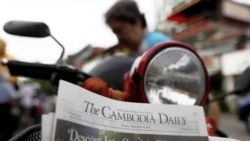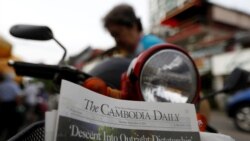Marking the 28th annual World Press Freedom Day, Cambodian Prime Minister Hun Sen published a letter on May 3 calling on news media to be guided by ethics and professionalism.
“I sincerely appreciate and place high value on our journalists who have made great efforts to overcome obstacles and dangers in fulfilling their duties to actively broadcast and publish news on what is really happening in the country,” the Phnom Penh Post cites him as saying.
Hun Sen called on local and international media to follow the law and refrain from “spreading fake news” that damages reputations and fosters “social chaos.”
"It’s the way to fight against criminals who seek to gain personal interests by using media as a cover to commit offenses that affect people’s dignity and the prestige of the media and professional journalists. This cannot be tolerated,” Hun Sen said.
Hun Sen’s claim to place a high value on journalism is false. The evidence suggests that those in Cambodia who actively report on “what is really happening in the country” face intimidation, assault and imprisonment.
Also on May 3, dozens of Cambodian nongovernmental organizations released a statement calling on authorities “to cease the ongoing harassment of independent media outlets and journalists for exercising their fundamental right to freedom of expression” amid a deteriorating media environment.
The journalist advocacy group Reporters Without Borders’ (RSF) 2020 World Press Freedom Index, which rates the media environment in 180 countries and territories, placed Cambodia toward the bottom (144th).
RSF stated that, prior to Cambodia’s July 2018 election, Hun Sen, fearing he could lose his grip after 36 years in power, launched “a major pre-emptive offensive against the media that devastated the journalistic landscape.”
That offensive included an outright ban on radio and newspapers critical of his government as well as a “purge” of staff at non-compliant news organizations.
In September 2017, the independent Cambodia Daily closed following what it called “extra-legal threats by the government.”
In 2018, the Phenom Penh Post underwent a massive editorial shakeup following what the advocacy group Human Rights Watch called its “coerced sale” to a Malaysian businessman tied to Hun Sen.
RSF stated: “Cambodians now only have access to news provided by major media groups directly linked to Hun Sen.”
The Phenom Penh-based Cambodian Center for Independent Media (CCIM) reported in February 2018 that the “facade of media freedom collapsed in 2017,” with authorities shuttering “32 radio stations carrying opposition, U.S.-funded or independent content.”
CCIM likewise linked that sea change to the July 2018 elections, and noted that journalists were being accused of “incitement” and espionage amid claims that “foreign agents” were working to overthrow the government.
The number of journalists who reported they had been attacked increased by 12% since 2015, the group reported, and 47% of those surveyed said they had been threatened.
“Journalists at outlets considered to be independent were more than twice as likely to have been verbally or physically attacked this year, at 20%,” CCIM wrote.
Journalists have also been arrested. Two Radio Free Asia journalists, Yeang Sothearin and Uon Chhin, were picked up in November 2017 on what Human Rights Watch called “baseless espionage charges.”
The arrests came soon after RFA, which is U.S. government-funded but editorially independent, shuttered its Cambodian operations after nearly 20 years. RFA said the closure followed “a relentless crackdown by Prime Minister Hun Sen's authoritarian regime on independent media.”
The Cambodia Daily’s Aun Pheap and Zsombor Peter were charged with “incitement to commit a felony” after reporting from a constituency in Ratanakiri province in May 2017 that Hun Sen had failed to win in 2012 communal elections.
Reporters Without Borders said the journalists had been hit with “absurd, trumped up charges” intended to “intimidate all of Cambodia’s journalists.”
The case against The Cambodia Daily journalists was dropped in November 2020. However Peter, who contributes to the Voice of America (a sister news agency to RFA), said the court’s decision not to proceed with the case meant little for the Cambodian press, as others are still being prosecuted for “doing their jobs.”
In November 2020, Ros Sokhet, who runs the Khmer-language news website Cheat Khmer, was sentenced to 18 months in prison for “incitement to provoke serious chaos in social security.”
His crime: Facebook posts criticizing plans by Hun Sen to name his son as his successor and a lack of government action on debt relief for those affected by the COVID-19 pandemic.
In December 2020, Sok Oudom, who runs the Rithysen 99.75 FM radio station and news website, was sentenced to 20 months in prison for reporting on a land dispute involving the military.
In October 2020, Sovann Rithy, who runs the Facebook news outlet FB TV, received a suspended 18-month sentence for repeating Hun Sen’s own comments. Hun Sen had previously told motorcycle taxi drivers hit financially by the COVID-19 pandemic to sell their vehicles to buy food, as the government could not help them.
In December 2020, Rath Rott Mony, a fixer for Russian state-owned broadcaster RT, was released from jail after serving two years for a documentary about child prostitution that Cambodian authorities called “fake news.”
In May 2020, the Cambodian League for the Promotion and Defense of Human Rights released a statement saying “at least a dozen journalists have been summoned and questioned by police and judicial authorities as a result of their reporting.”
Citing the COVID-19 pandemic as the pretext for an intensified media crackdown, the group said “[t]he ongoing arrest, detention and judicial harassment of journalists for critical reporting is a serious violation of the Cambodian people’s right to information.”
Cambodia’s media crackdown has been accompanied by a clampdown on free speech and political participation.
Since 2017, the government has systematically dismantled the political opposition, banning the Cambodia National Rescue Party and prosecuting its leaders.
The rights group Amnesty International estimates 150 people affiliated with the CNRP are facing mass trials on charges the group calls “an affront to international fair trial standards.”
In February, Hun Sen signed a sub-decree to set up a National Internet Gateway (NIG). Critics fear the NIG will mirror China’s “Great Firewall,” which strictly monitors and censors online content.







